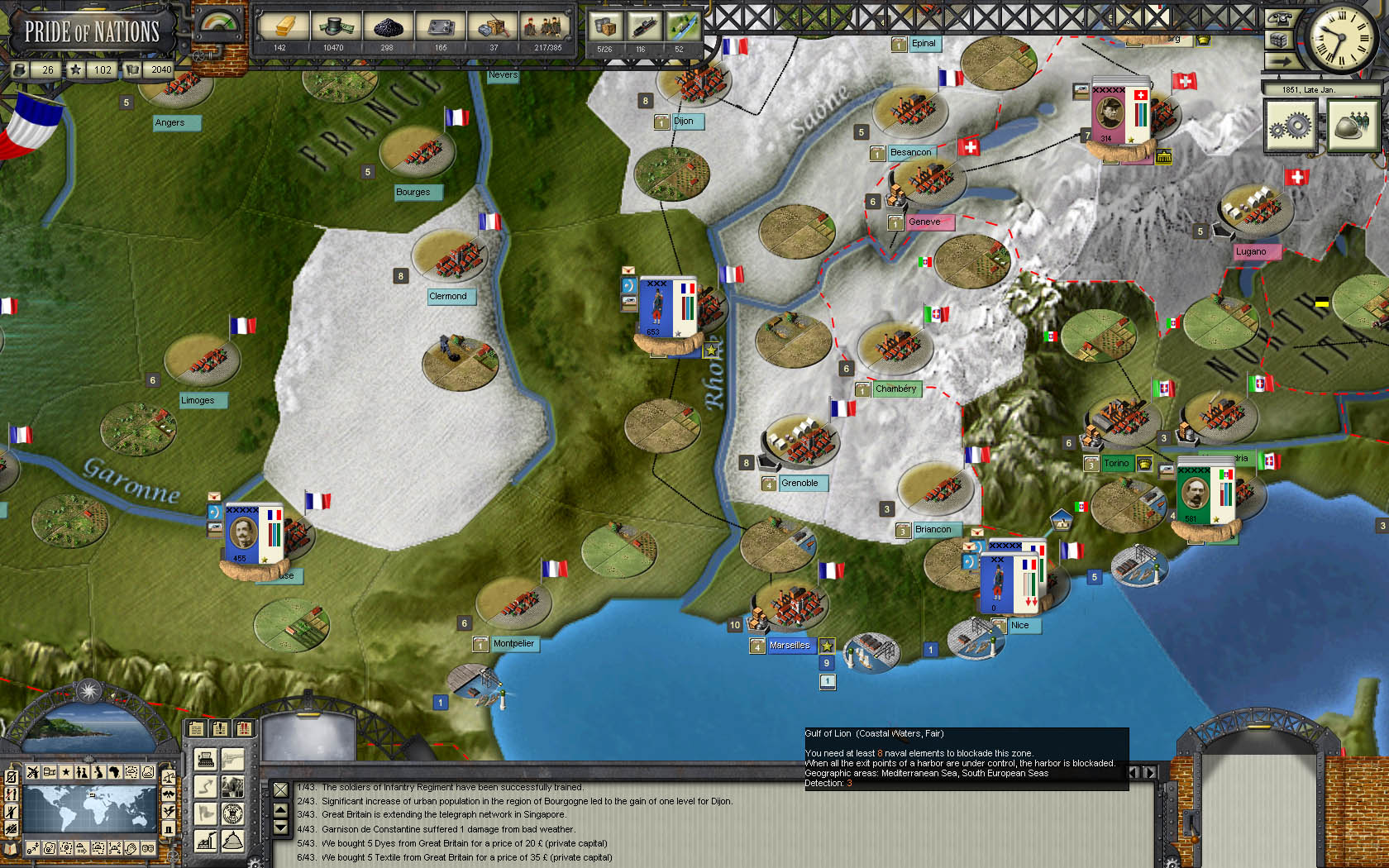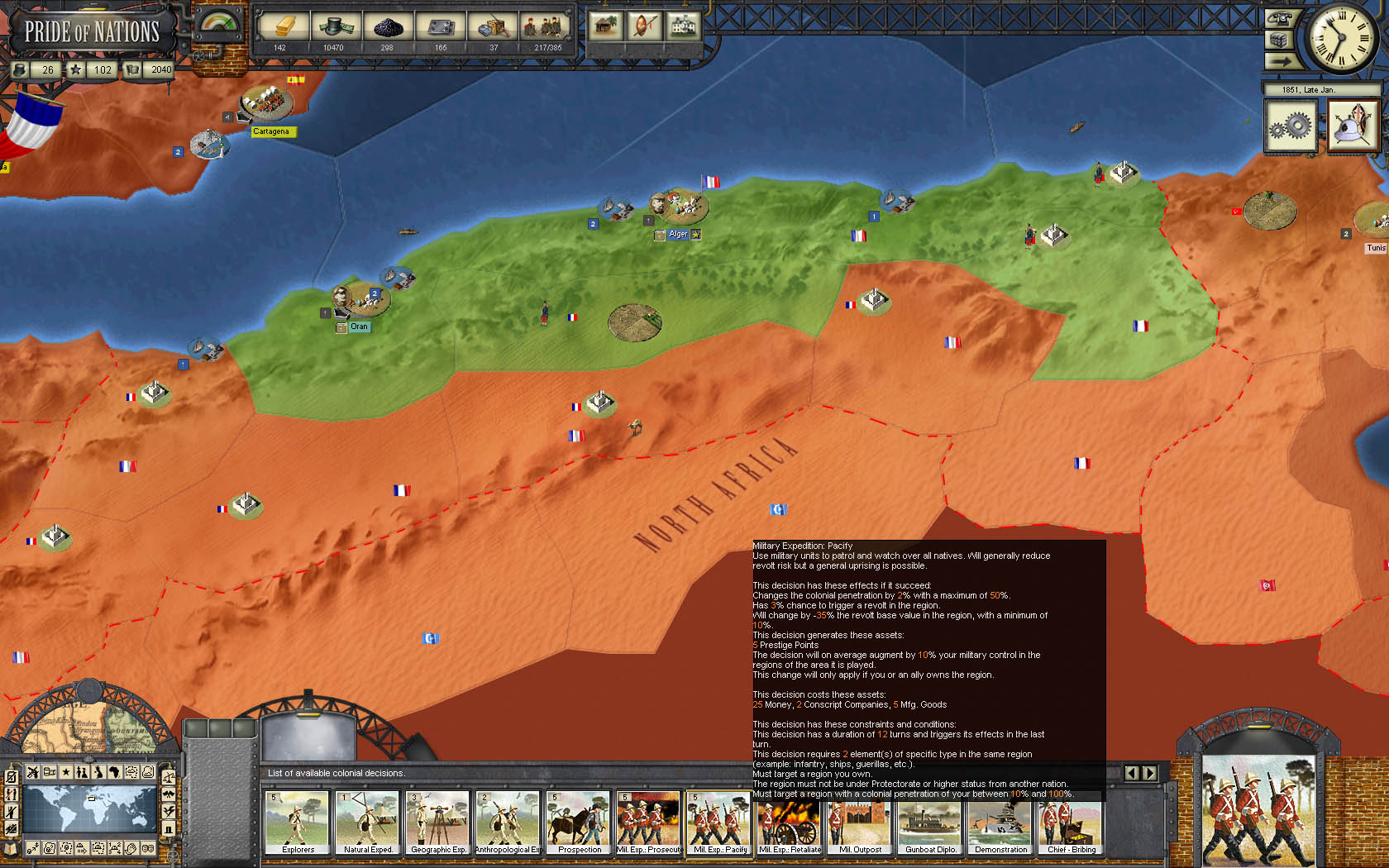Search
[{{{type}}}] {{{reason}}}
{{/data.error.root_cause}}{{{_source.title}}} {{#_source.showPrice}} {{{_source.displayPrice}}} {{/_source.showPrice}}
{{#_source.showLink}} {{/_source.showLink}} {{#_source.showDate}}{{{_source.displayDate}}}
{{/_source.showDate}}{{{_source.description}}}
{{#_source.additionalInfo}}{{#_source.additionalFields}} {{#title}} {{{label}}}: {{{title}}} {{/title}} {{/_source.additionalFields}}
{{/_source.additionalInfo}}- Details
- Category: Computer
- By Tritherian
- Hits: 11962
Pride of Nations (PC)

Developed by: Paradox France
Published By: Paradox Interactive
Release Date: Jun 7, 2011
ESRB Rating: Teen
Genre: Turn Based Strategy
Number of Players: 1 to 8
MSRP: $19.99
Thanks to Paradox and Gamers Gate for sending us this game to review!
Have you ever dreamed of ruling one of the greatest nations of the Victorian era? To experience guiding a people into the industrial revolution and the modern age? Pride of Nations lets you do just that, through economic wizardry, military conquest, colonization and diplomacy. But you won't be able to run things however you want. Pride of Nations takes great pains to be historically accurate. As such you will have no control over major events and national policies, so don't expect to be able to radically change your nation's government at a whim, not without some historical context.
If all you want to do is relive specific historical battles, you can do so by choosing a battle scenario. These scenarios have predefined sides and specific victory conditions. During battle scenarios, economic options are disabled so that you can focus on commanding your troops. But if you're feeling more ambitious, you can pick one of eight nations to lead from 1850 to 1920 in the grand campaign. The ultimate goal of the grand campaign is to amass more Prestige Points than any other “great nation.” Prestige Points can be gained in a number of ways, mainly: winning battles, gaining new colonies or completing specific objectives. But not all nations are created equal, as your starting prestige will depend on the nation you are playing. Great Britain has quite a head start on everyone else, whereas Japan will need to play catch-up. This is an inherent problem I have with “historical” games; there's no option for everyone to start out on equal footing. Add to this the limited selection of nations to play as, plus the restrictions placed on how you run them, and I find myself wishing for a little more freedom.
Whichever nation you end up choosing, they mostly play the same, both in the grand campaign and in battle scenarios. Pride of Nations is a turn based game, where each turn represents approximately two weeks. But unlike many other titles in the genre, it uses a simultaneous turn system. This means that all players plan their moves at the same time, without any foreknowledge of what their opponents will do. Once the turn is ended all orders are carried out, and you will have to wait until the next turn starts to act. This system is designed to help speed up multiplayer matches, as well as make the game a little more unpredictable. The latter is true, but the former doesn't quite pan out. Each turn can take up to two minutes to fully resolve, thus killing the flow of the game. All that waiting will likely bore all but the most stalwart of players.

Strong points: Highly detailed trade and military models; good music; grand scale.
Weak points: Low quality graphics; steep learning curve; complex interface; limited diplomatic options; only eight playable nations; long turn resolution.
Moral warnings: Nations war, but with off screen battles; some colonial options involve repression of the native populaces.
Another letdown is the graphics. This type of game really doesn't need to have the prettiest visuals to be fun, but in this case they are a hindrance to the experience. Pride of Nations takes place entirely on a world map that looks downright ugly when zoomed in. Details on the map, such as buildings and resource icons, are also rather bland and uninteresting. Fortunately there is some nice music to keep your ears from suffering the same boredom as your eyes, consisting of a large selection of music from the era. It really does enhance the historical feel of the game, but there isn't much in the way of other sounds.
Production values aside, the gameplay is what really matters. Like many grand strategy games, Pride of Nations is rather complex. There are some tutorial missions to help you get started, but they really don't give you all the information you'll need to play the grand campaign. This is one game where reading the manual is almost mandatory. But even its 142 pages don't cover everything. Fortunately there are tool-tips for just about everything in the game. Even so, this is not a game that you can just pick up and play. Simply trying to describe all of the systems and gameplay mechanics would take too long. But I will endeavor to cover some of the essentials.
The first thing to understand is that there are four separate modes in the game: Economic mode is all about production and trade routes, Military mode is where you move armies, Decision mode gives you options to affect your nation in various ways, and Colonial mode shows you the status of colonial territories. In addition each mode has its own sub-mode: The Economic sub-mode allows you to construct economic buildings and upgrades, the Military sub-mode is where you recruit new units, the Decision sub-mode gives you a number of diplomatic decisions to make, and the Colonial sub-mode allows you to shape and form new colonies.
There really isn't all that much to the Decision or Colonial modes. You basically choose an action card from the bottom bar, when in a sub-mode, and drop it into a region. The real meat of this game is in its highly detailed military and economic trade models. While battles are rather bland, from a tactical standpoint (just a bunch of number crunching), the interesting part is the building and organization of an army. You can form a force from various unit types into an army of many hundreds of thousands strong. In order to have an army fight effectively they need to have a leader. Leaders will rise up in your nation and can be assigned to any force you choose. Generally, the better the leader, the more men he can command efficiently. Moving an army is simply a matter of dragging and dropping the unit card where you want to move. If there is an enemy army in the region, there will be a battle. Whether you win or loose depends on a number of factors, such as number of men, quality of equipment, amount of experience, morale level, supplies and leader bonuses.

Higher is better
(10/10 is perfect)
Game Score - 68%
Game Play: 16/20
Graphics: 5/10
Sound: 6/10
Stability: 4/5
Controls/Interface: 3/5
Morality Score - 84%
Violence: 8//10
Language: 8/10
Sexual Content: 8/10
Occult/Supernatural: 10/10
Cultural/Moral/Ethical: 8/10
But you can't build and maintain an army without money and supplies. The economy in Pride of Nations is very detailed and dynamic. There are many commodities that your nation can produce, buy and sell. Some commodities have more direct effects than others, but they all contribute to your economy. You can put any excess goods up for sale and buy things you need from other nations. This system features dynamic prices, so expect them to change often. Supply and demand play a key role in who gets what and for how much, so you'll have to keep an eye out for the best deals.
All this makes for a very rich and detailed experience, for those that like organizing large armies and juggling stock prices. But the interface just doesn't seem up to the task of making all of this complexity accessible. While you can view a lot of information, it can be hard to figure out what it all means and how it affects the game. The trade interface, for instance, requires you to have your mouse pointer over a nation and press 't' to open up the trade window for that nation. This makes comparing prices rather tedious. You have to do this every time you want to view a nation's trade window. So, while all this historical detail might be something of a learning experience, it's just too complex and slow for most adults, let alone children. This is a little unfortunate, as there is really very little objectionable content. There are battles but, unless you're squeamish of numbers, there's no on screen violence, though the sounds of battle can be heard. Status messages at the beginning of a turn will mention events that have happened in the world. Some of these include violent activity (such as murder), and some sexual references (including rape), but nothing explicit (the full ERSB rating mentions “mild language” but I did not encounter any of it, so I cannot comment on specifics). However, there is one aspect of the game that I find a little disturbing. While you do have to have a Casus Belli (a stated reason or cause for war) in order to attack another nation, there is another way to start violence without such formalities: Colonization.
Colonization was a big deal for major nations in the mid to late 19th century. Now I'm not here to start a political discussion on the moral ramifications of colonialism. It is depicted in the game as a way to get some extra Prestige Points, plus any resources that a colonial region might offer. But the problem comes in the methods used to gain and hold a colony. Some of the colonial actions involve taking military action against the populace. Every action has a chance to start a revolt, or a full on uprising, even the more benign ones. This all feels very detached and impersonal, and I guess that's what really bugs me. You don't think of the natives or solders you send to their deaths as people; they're just another resource to use towards your goals.
Over analyzation of moral ramifications aside, is the game fun? That will depend on how much you are willing to put into it. Pride of Nations is like making a fancy soup: you must wait for the broth to heat up while you add ingredients one at a time, in the right order, at the right time. It takes time and effort, and you need to look at the recipe a lot, but in the end it is a hearty meal... so long as you like soup. So it's not for everyone, and it isn't supposed to be. But the long wait between turns, low grade graphics and the sometimes clunky interface will be a hindrance to anyone's enjoyment. The sheer amount of time that you must invest to learn the game puts to mind a verse in Ecclesiastes. In chapter 2 Solomon describes all of the great things he has built and concludes: “ Then I looked on all the works that my hands had wrought, and on the labour that I had laboured to do: and, behold, all was vanity and vexation of spirit, and there was no profit under the sun. ” How much more so when those works are just points of light that live on a hard drive?






